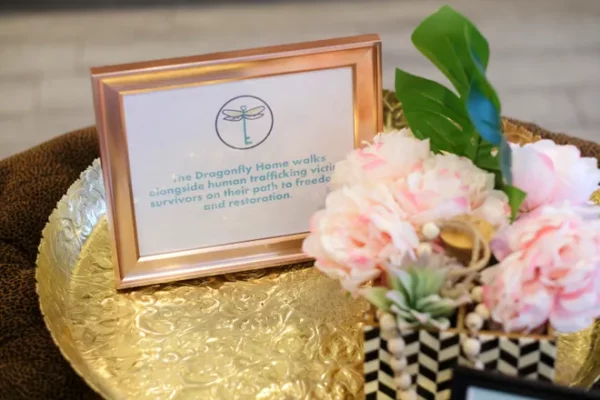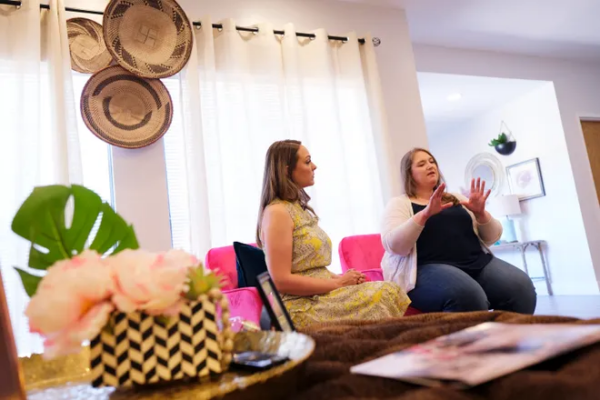Dragonfly Home helps victims of human trafficking with housing program – Oklahoman.com
Watch video here.
An Oklahoma City nonprofit will open a transition home for human trafficking victims later this year with organizers hoping to serve those affected while also educating the public about sexual exploitations.
“If we as Oklahomans were more aware of the crime of human trafficking, it couldn't flourish like it is now,” Executive Director Whitney Anderson said.

The Dragonfly Home started as a crisis center in 2016, aiding sex and labor trafficking victims by providing resources such as legal assistance and therapeutic services.
Now, the nonprofit has a nine-bedroom house for women who have experienced human trafficking and need shelter, becoming the first and only transitional house in Oklahoma City certified by the Oklahoma attorney general's office. All services provided by the Dragonfly home are free.
The Dragonfly Transition Home is opening as reports of sex trafficking and forced labor multiply across the country. In 2020, the National Human Trafficking Hotline reported 10,583 reported trafficking cases, a 37% increase in just five years. In May, Oklahoma legislators approved using $5.3 million from the state budget to to create a human trafficking response unit.
Anderson said the state certification process, while rigorous, ensures their services are effective and ethical by requiring trauma-informed training and safety policies.

“There are people making sure that service providers are providing the highest quality and best care for survivors of trauma,” Anderson said. “We love that accountability and transparency.”
The bright and comfortable environment filled with vibrant colors and welcoming furniture is all a part of their “home-like” philosophy.
“Over the years as we've talked with clients and even done research on evidence-based practices, we've seen creating a colorful environment, working in different cozy textures and this feeling of warmth, actually goes a very long way in the healing process,” Anderson said.
The house has a playroom for women with children, multipurpose rooms for meditating or building life skills and a spacious backyard.

“If you create this atmosphere that fosters that healing and that empowerment, it's been very effective,” she said.
Misconceptions about human trafficking are common
The organization has served 600 people and has received over 6,000 hotline calls since becoming state-certified, Anderson said. She said most of their hotline calls come from referrals from frontline professionals, like law enforcement or teachers.
This is notable, she said, because bystanders have a key role in identifying and reporting possible cases of human trafficking.
“People might go into a training and think, ‘Oh, I'm never going to come across this. This is rare,'” Anderson said. “But time after time we see that when someone learns what trafficking looks like, suddenly they're calling our helpline because they're realizing that actually they're seeing it way more often than they ever would have expected.”

Anderson and her co-founder, Melissa Eick, said they believe misinformation about human trafficking has led to likely cases being undocumented.
Eick, director of communications and development, said a common misconception is human trafficking involves only organized crime or movement of victims. She said the misconceptions shift the blame of human trafficking. It's Oklahomans who are seeking out illicit sex and labor, she said.
“I think that since we started, that's maybe been one of the things that shocks people the most,” Eick said.
The perpetrators of human trafficking are most often family members or close partners of the victim, not strangers, Eick said.
“That doesn't always fit within people's frame of reference for what trafficking looks like. But we hear that kind of thing. It's actually pretty common,” Eick said.
Eick said traffickers prey on the vulnerable populations in Oklahoma. The state's rates of incarceration, homelessness and substance abuse all contribute to the prevalence of human trafficking.
“But what we like to point out is, the reason that trafficking exists in Oklahoma is because there's a demand here. There's a demand for illicit sex, there's a demand for cheaper, free labor,” she said. “And so they're treating human beings as their products. Traffickers are experts at just spotting those situations, and saying what they need to say to get a foothold in someone's life to then exploit them.”
Conversations with youths about human trafficking important
Anderson and Eick recommend talking about trafficking, especially with children and youths. While the conversations might be uncomfortable or seem inappropriate for some, they said it is important to warn young people about the dangers of human trafficking as minors are a targeted group.
“I keep tying it back into the myths and misconceptions, but if we believe that traffickers are following us in Hobby Lobby, or in white strange kidnapper vans, and they're gonna swoop you out of a parking lot off of I-40, you're not going to be paying attention to the person that your daughter is talking with online,” Anderson said.
“It's so much more nefarious than what we see in movies and how that's depicted,” she said.
How to get help for victims of human trafficking
Victims of human trafficking can call the Human Trafficking Hotline at 888-373-7888 to set up an interview, and see if transitional housing would benefit them.
For those looking for opportunities to serve, Anderson and Eick said the organization needs help through volunteers and donations listed on their website.
“It's not so far away from you. It actually is happening right here to people who are from Oklahoma, and they're trafficked by people from Oklahoma,” Anderson said. “I would say that it's not this concept that's so far removed from us that could never affect us.”
For more information about The Dragonfly House, go to https://www.thedragonflyhome.org.
This “Eyes on Trafficking” story is reprinted from its original online location.
 ABOUT PBJ LEARNING
ABOUT PBJ LEARNING
PBJ Learning is a leading provider of online human trafficking training, focusing on awareness and prevention education. Their interactive Human Trafficking Essentials online course is used worldwide to educate professionals and individuals how to recognize human trafficking and how to respond to potential victims. Learn on any web browser (even your mobile phone) at any time.
More stories like this can be found in your PBJ Learning Knowledge Vault.
EYES ON TRAFFICKING
This “Eyes on Trafficking” story is reprinted from its original online location.
ABOUT PBJ LEARNING
PBJ Learning is a leading provider of online human trafficking training, focusing on awareness and prevention education. Their interactive Human Trafficking Essentials online course is used worldwide to educate professionals and individuals how to recognize human trafficking and how to respond to potential victims. Learn on any web browser (even your mobile phone) at any time.
More stories like this can be found in your PBJ Learning Knowledge Vault.
